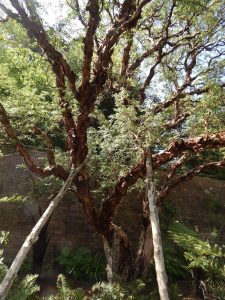 As an intern at Logan, visitors often ask me questions about the garden while I’m working in the beds. One of the plants I am most frequently asked about is Polylepis australis belonging to the family Rosaceae and sometimes called the filo pastry tree here in the UK.
As an intern at Logan, visitors often ask me questions about the garden while I’m working in the beds. One of the plants I am most frequently asked about is Polylepis australis belonging to the family Rosaceae and sometimes called the filo pastry tree here in the UK.
The large, gnarled UK champion tree growing at the back of the walled garden at Logan, propped up in several places is striking. Polylepis australis’s claim to fame is its unique and wonderfully weird peeling bark. The papery rolls which adorn the tree, and its several progeny found dotted around Logan is the plant’s response to harsh winter conditions.
The tree is endemic to the Andean mountains, where it grows at higher elevations than any other woody plant, necessitating the characteristic survival mechanism.
Although rather uncommon in cultivation in the UK, this tree would be quite happy in sheltered gardens throughout most of the country, being hardy down to -15 degrees celsius.
It grows relatively quickly and with the proper care it can be kept as a small multi-stemmed tree or a shrub.
Polylepis australis has quickly become one of my favorite of the many unusual trees here at Logan and I encourage visitors to Scotland’s most exotic garden to look out for it!

Karen Angella Brown
Nice! I’ll be sure to check that one out, Vida. I really like your writing style: concise, clear and very professional.
Bev Sharpe
We think our polylepsis Australis is dead. We had a really hot summer and it doesn’t seem to have survived. No green leaves and just looks limp and sad. How can I help it? I absolutely love it. Please help
Anne Ramsay
Hi Bev,
It can be deciduous. It will survive a hot summer no problem. The best thing to do is to rub the bark to see if it is still alive. If it is green it is still alive. I hope this helps.